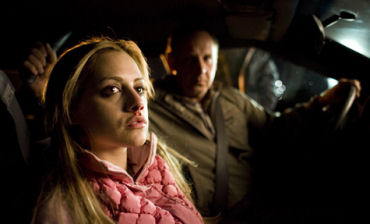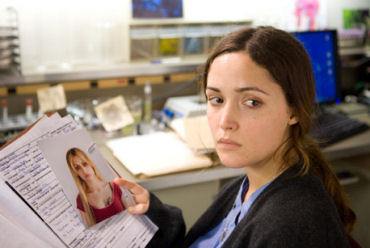It’s not a rumor — several of the performances in Karen Moncrief‘s The Dead Girl (First Look, 12.29) are knockout. And I’m not talking about efforts by guys. This is an honest, penetrating but extremely maudlin film about women suffering greatly — the term “deeply depressing” doesn’t begin to describe — and yet it’s a wow on a case-by-case, actress-by-actress basis.

Brittany Murphy‘s inhabiting of a damaged-goods, irrevocably doomed prostitute/ absentee mom is prickly, agitated and full-on. She’s both pathetic and breathtak- ing. It’s a cliche-ish thing to say that Murphy has expanded her range and career prospects in one fell swoop, but that’s pretty much fact. She’s only on-screen for 20 minutes or so, and there isn’t time for her character to express more than two or three shades of desperation. She’s playing a woman with so many problems that the only question is when, not if, a random collision with this or that predator will take her down for good, but Murphy’s blending of feisty combativeness and sadness feels volcanically alive.
Marcia Gay Harden, who plays Murphy’s mom, has proved again how precise and soulful a performer she can be. Mary Beth Hurt is mesmerizing in a weird, over-the-hill way as a lonely and unbalanced partner of a fiendishly secretive middle-aged man. (It’s obviously sexist of me to report that the twitchy neurotic fox from Interiors and The World According to Garp has been eradicated by age, but it’s a fact nonetheless.) Also top drawer are Toni Collette, Piper Laurie, Rose Byrne and Kerry Washington.
But the color palette in The Dead Girl is pale and splotchy, and the mood of it is down, down…all the way down. Moncrief, who wrote and directed, has invested herself and her cast in an orgy of dingy, hopeless, lower-depths misery. Her female characters (the guys are mostly creeps or louts) are either sad or trauma- tized or badly bruised, or a combination thereof. There’s no question that Moncrief regards them with the utmost compassion and respect, but she’s mainly interested in how it feels to be in their cages — caught, desperate, unable to escape.
There’s a saturation point with films like this, a point at which you mutter to your- self “enough already” as you realize (or re-realize, having been here before) that for some filmmakers being immersed in grief and despair and down-headedness deli- vers a kind of perverse emotional high. Yeah, I know…strange.

Rose Byrne
It needn’t be this way. Rodrigo Garcia‘s Nine Lives — another film with superb female performances — was a more balanced and compassionate piece; you could feel Garcia’s generosity of feeling, as you can with Pedro Almodovar‘s Volver. These men care for their characters; they want them to some how pull through — and I don’t get this feeling from Moncrief at all. It’s not the hurting-women thing that’s hard to roll with — it’s the aroma of futility and put-upon female victimization that Moncrief is obviously queer for.
Moncrief’s Blue Car, which I saw at Sundance ’02, convinced me she was a comer. Now I’m starting to wonder. Why would a director-writer want to go so far down into a well that there’s no sunlight or air?
But once again, hats off to Murphy, Harden, Hurt, Collette, et. al. Murphy is good enough to be considered for a supporting actress honor, but The Dead Girl is going to die so quickly — it’s going to make about $950 dollars, if that — that her only chance is for thousands of screeners to be sent to press and Academy members (like the Lionsgate team did last year for Crash), and I doubt if First Look has the resources to do this, so the odds aren’t favoring.









